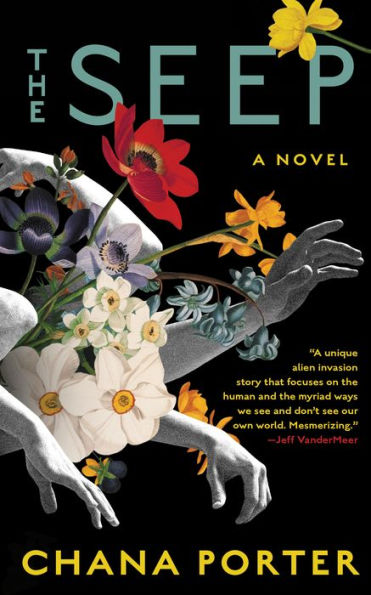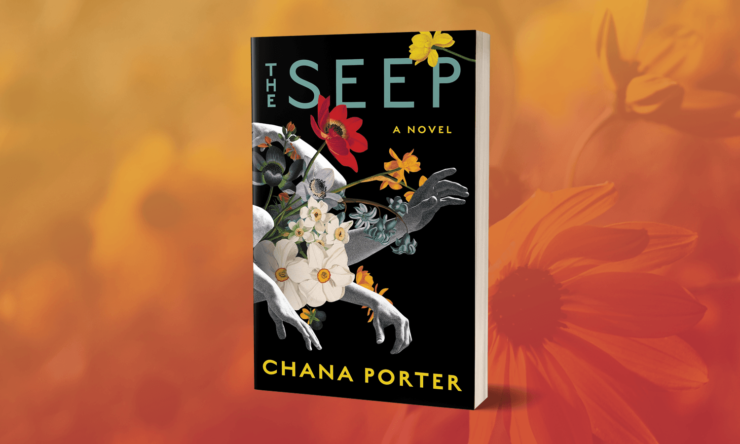The Seep arrives on our planet, and everything changes. It is an alien entity that seeks symbiotic communion with life on earth—human and nonhuman animals, plants, objects—and in return for sharing our embodied being, it collapses distinctions, hierarchies, and systems into one shared experience. Capitalism falls; so, of equal import, does human mortality (except in cases of extreme physical misfortune or the personally-made choice to die).
Trina FastHorse Goldberg-Oneka is a fifty year old trans woman, married to the love of her life Deeba. Until, that is, Deeba decides to be recreated into a baby to live a whole new life: to be parented well, to give up her histories of trauma, to no longer hold the baggage of the pre-Seep past. Trina refuses to be that parent and the two, necessarily, split up—leaving Trina mourning, wounded, and unsure of the costs of a world without a connection to experiential histories.
While The Seep is a debut novel, Chana Porter is also a playwright and education activist with a number of achievements in her fields, including the receipt of an Honorable Mention for the Relentless Prize and a MacDowell fellowship. She is currently writer-in-residence at The Catastrophic Theatre in Houston.
The Seep begins and ends with directive vignettes, titled “Tips for Throwing a Dinner Party at the End of the World” and “Tips for Attending a Dinner Party When Your World Has Ended and Another World is Just Beginning.” In each, Porter gives instructions on being present, being whole, being open; she writes about intoxication and design and desire, companionship. However, these vignettes are also statements about the project of the novel underneath all the weird and fanciful biocultural advances: what do you do when a relationship dissolves and you lose someone? At the heart of the matter is grief: for a person, for a world, for a sense of self.
Buy the Book


The Seep
In the grand tradition of didactic sf, Porter has a ton of philosophical questions as well, but the protracted process of grieving is central to the novel. The feeling of losing something and being unable to move on, both a literal person and a way of life, comes through with powerful clarity in The Seep. Trina is snarly, mean to strangers who intrude on her mourning. She lets her house go to seed, starts drinking, stops going to her fulfilling job at the hospital, makes her friends worry. Even Trina’s sudden attachment to the idea of rescuing the compound boy she runs into isn’t about him, so much as it is about her finding something to take her out of her grief and open a door to a new shot at the world. It’s a quest. She’s hurting, and it’s hard to move through that, which is a challenging feeling to portray so well. Props to Porter for that, especially in a debut novel.
As for other thematic notes, Trina also skillfully articulates the tension between building solidarity around difference and a liberal collapse or erasure of difference. While the ethical and political context behind this argument is deliciously complicated, and always requires individual effort for critical engagement, Porter’s protagonist makes it real to us through the body and relationships. We are all connected, and often do share some markers of oppression; culture is changeable, transmittable, and ever-evolving through exchange and appreciation. But—as with Horizon Line’s theft of his dead boyfriend’s brown face—it is not meaningless, or as simple as a bit of clothing to take on or off. Histories and experiences create us, as do our struggles and suffering, and those differences are significant and can remain in the frame while we connect.
Trina moves through the world as a queer woman who transitioned well before the Seep arrived, who is Native American and Jewish, maintaining constant connection to those histories through her daily practices. While she explicitly agrees she doesn’t want to reduce ‘good art’ to ‘necessary suffering’ at one point during a dinner-party argument, she also argues that conflict and desire, struggle and labor, are important to experience—which is important to art. It’s a fine line to walk, but an important one that resists easy answers or binary thinking. Part of the conclusion of the novel is her arguing with the Seep that humans should be allowed to be unhappy because it’s their choice to make mistakes, then to learn and grow from them.
(Mild spoilers follow.)
Structurally, though, The Seep is not necessarily a total success. The third and final section of the novel feels underdeveloped. On the one hand, Porter’s delicate skating over the surface of her world allows for an effortless naturalism to the societal and relational shifts—we move with Trina, with the skimming touch she balances alongside her grief-stricken heaviness. On the other, the novel’s ending is lean and abrupt to the point of coming across rushed (and not purposefully so). The book itself reads more as a novella or otherwise-luxurious piece of short fiction, lacking enough of the flesh that might stabilize its deeply interesting, thoughtful bones. With Trina’s personal revelation and the rescue of the Compound boy at the conclusion, the threads are all tied-off neatly but, to extend the metaphor, perhaps with a handful of dropped stitches preceding.
Despite the sense of unfinished or unrealized narrative space, which I did leave the book itching over, the emotional and thematic sketches Porter draws in her strange soft-apocalypse future also fill up the reader’s brain for later perusal. The simplicity of her work is delightfully deceptive, as Trina’s butch and straight-forward approach to the world—the lens we perceive it through—is rich, thorough, considerate, grumpy, loving, and flawed simultaneously. Her explorations of loss and grief, what it means to be grieving and messily so, especially for longer than people find acceptable, are spot-on.
Porter also offers the reader those questions and critiques of power and identities that I discussed previously—but doesn’t give direct answers every time. Instead she trusts the reader to take the provocation and consider optimism and potential, even after the end of one world at the beginning of the next, and to refuse a reflexive or uncritical utopia in favor of a queer and dangerous expansiveness. Trina is a refreshing protagonist, radiating the calm steadiness of an older queer woman even through her own progressive breakdown and her disillusionment with the Seep’s changing world.
The Seep contains gorgeous ideas and images in conflict, as well as in concert, that are worth carrying out of the text to admire further: who are we, and what are our bodies, made up as they are of experiences and histories? Culture resides in those spaces of experience that are not reducible to a shared ‘oneness’ in the star-stuff we’re all technically made of. If the semibenevolent overthrow of the earth occurs, clashing one literally alien thought-pattern against the human-animal as each tries to find manners in which to exist with satisfaction and comfort, what is the outcome we hope for? Porter has a handful of central questions, but the answers Trina finds for herself at the end about “grief and letting go” offer a link between them all. As Porter writes to close out the book, “Enjoy life. Because even with the promise of forever, nothing lasts.” Change is both/and: hope and pain, loss and potential and desire, then quite a lot more on top.
The Seep is available from Soho Press.
Read an excerpt here.
Lee Mandelo is a writer, critic, and editor whose primary fields of interest are speculative fiction and queer literature, especially when the two coincide. They have two books out, Beyond Binary: Genderqueer and Sexually Fluid Speculative Fiction and We Wuz Pushed: On Joanna Russ and Radical Truth-telling, and in the past have edited for publications like Strange Horizons Magazine. Other work has been featured in magazines such as Stone Telling, Clarkesworld, Apex, and Ideomancer.










